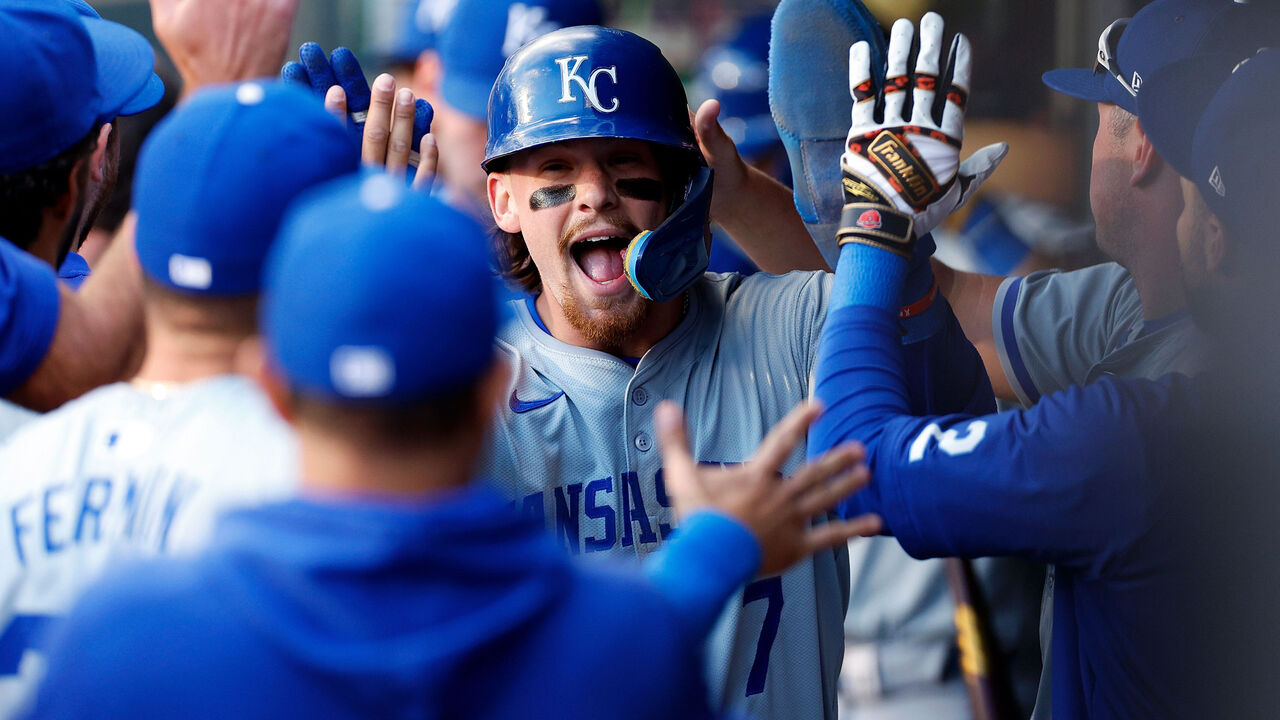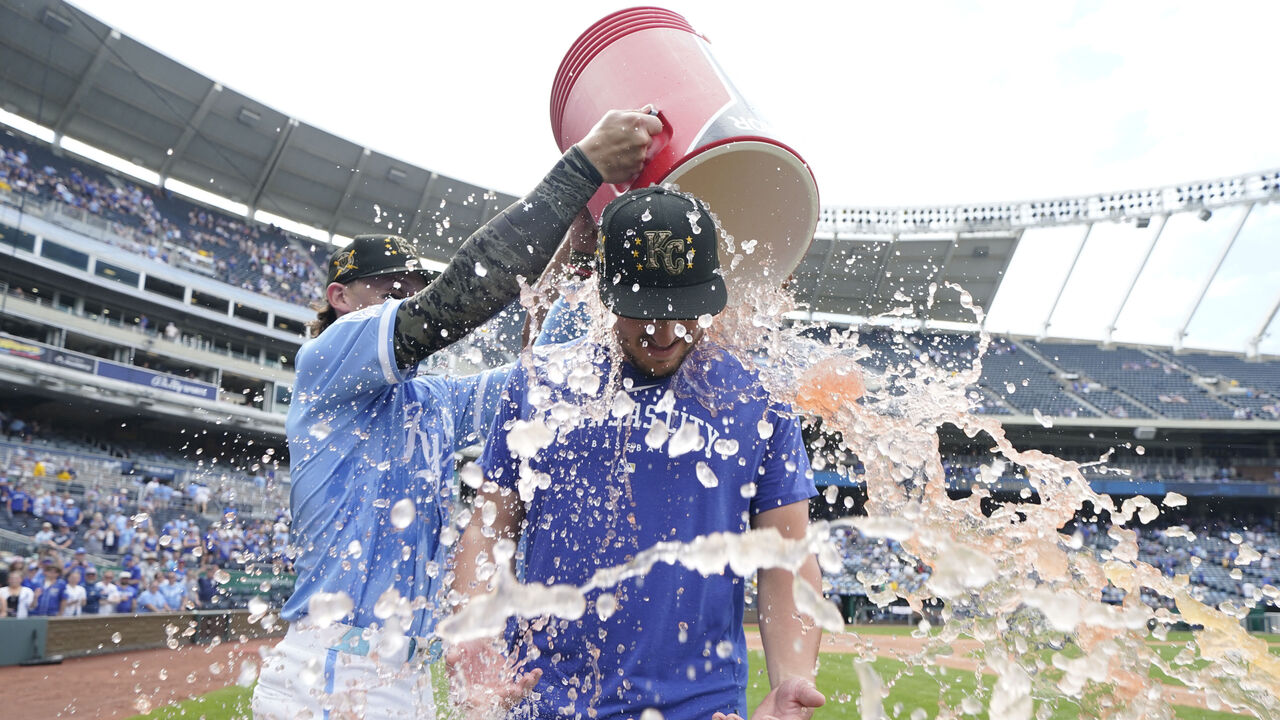How Bobby Witt Jr. turned big potential into elite production
As Kansas City Royals second baseman Michael Massey went to pregame infield practice this week in Cleveland, he used Bobby Witt Jr.'s backup glove. Embroidered in the glove's webbing was one word, a cue for Witt's mindset: "Simple."
At his locker, Witt motioned to his game glove. "Simple" was written on it in blue permanent marker, although it was now streaked and smudged from use and the elements.
Major League Baseball is more difficult than ever, especially for young position players. Pitching velocity is faster, breaking balls are nastier, and scouting data richer. The game seems impossible to master, yet Witt is doing just that.
The Royals' 24-year-old shortstop has already produced 9.5 fWAR this season, tied for the 20th-best mark in MLB history among players 24 and younger - sandwiched between greats like Ty Cobb, Rogers Hornsby, Albert Pujols, and Alex Rodriguez. There's still a month to play.
If it weren't for the exploits of Aaron Judge, Witt might well be the favorite in the American League MVP race. He's making the 11-year, $289-million deal he signed before the season seem like a bargain.
"I try to keep it as simple as: See ball, hit ball," Witt told theScore. "Nothing more, nothing less than that."
Initially, his words felt unsatisfying. How could one of the most remarkable under-25 seasons in history - with the fourth-best WAR increase (3.6) and fourth-best wRC+ increase (60 points) over last season - not be due to some sort of addition of specialized training?
Witt didn't go to Driveline Baseball like teammate Vinnie Pasquantino did two offseasons ago with the hope of generating more bat speed.
Witt didn't spend time in a pitch simulator to accumulate reps, nor did he work in a biomechanics lab to map his swing.
Pasquantino enjoys a front-row seat to this remarkable breakout. To hear him explain it, the process is simple.
"I'm about to cuss, just to let you know," Pasquantino said. "He's got more 'F--- you' in him now: 'You have gotta come to me. You have to pitch me.' His chase has gone down, strikeouts down; exit velocity, hard hit up."
Every metric, whether it be traditional measures (.344/.396/.613 slash line entering play Friday) or the underlying ones supporting them, is trending up for Witt.
Bobby Witt Jr. joins the 25/25 club for the 2nd straight season!
— MLB (@MLB) August 16, 2024
Of course he did it with the Pablo Sanchez bat. 😤 pic.twitter.com/MBjb0sSVfY
He's tied for the 10th-best gain in exit velocity (2.5 mph over 2023) among the 440 batters with at least 400 plate appearances last year and over 100 this year. He's also cut down on his strikeout rate by 2.2 percentage points to 15.3%. That reduction is impressive since his rate was already below the MLB average.
Royals director of hitting performance Alec Zumwalt explained how the performance gains are connected.
"Swing decisions and exit velocity go hand in hand," Zumwalt said. "One thing we have always preached with him, and others, is once you get in that batter's box, all you can truly control is what you swing at."
That explains why Witt's exit velocity is not just up overall, but up 3.5 mph (to 98.8 mph) on pitches within the "heart" of the strike zone, according to Baseball Savant. That ranks seventh in the majors among hitters to see at least 100 pitches. (The MLB average is 92.6 mph.)
Witt may try to keep his execution simple, but getting to this point wasn't.
As talented an athlete as he is, he wasn't a great hitter in his first two years in the majors.

He posted a paltry .294 on-base mark and 98 wRC+ as a rookie. In his second year, he made a modest improvement with a .319 OBP and 114 wRC+.
Witt was the No. 2 pick in 2019 from Colleyville Heritage High near Dallas, and his first full season in pro ball was during the COVID year. Minor league seasons were canceled, and the Royals' top farmhands were limited to working at the alternate site.
Witt had logged only 744 minor-league plate appearances when he debuted in the majors in 2022.
Zumwalt took charge of the Royals' hitting program in 2019, and his immediate focus was to make practice more game-like. He was always fascinated by other sports, like the NFL and NBA, which practiced at game speed. Baseball often didn't.
Prospects like Witt, Massey, and Pasquantino - all from the 2019 draft class - faced more pitches from high-velocity and breaking-ball machines and fewer lobs from coaches.
Zumwalt also preached about using heavier bats. Witt went up an ounce from his 33-ounce model: more mass equals more power.
That work helped Witt and his teammates get to the majors, but then there were the inevitable roadblocks set up by the best pitchers on the planet.
Although Witt was never demoted like Baltimore's Jackson Holliday and many other top prospects, he struggled with velocity and chasing too many pitches. In the depth of a lull last May, Zumwalt changed things up.
In addition to the regular reps against high-velocity fastball and breaking ball machines in the batting cage, Zumwalt ramped up intensity in pregame work on the field with his own arm.
As a former minor-league pitcher, which is unique among MLB hitting coaches, the 43-year-old retains a good arm. He began by placing an L-screen in front of the pitching mound and threw his best stuff at Witt.
He wanted Witt to see pitches out of a human hand - not just spit out by machines. He wanted to sharpen a sense of when to swing.
"I told him, 'I am trying to blow your doors off,'" Zumwalt said. "That was a big moment for him to get going again."
He said Witt's bat speed makes him "like a Ferrari."
This season, Witt's average swing speed is 74.7 mph, per MLB data. That puts him in the top 10% of batters who have faced at least 100 pitches this year. (The MLB average is 71.5 mph.)
"I've never driven a Ferrari, but I imagine if I touch the gas, it's going to go," Zumwalt said. "But (the key) is to not be out of control."
As the pregame reps accumulated, bolstered by the game reps at night, the first breakout occurred last season. After posting a .742 OPS in the first half, Witt posted a .906 mark in the second.
"It comes from playing the game more, you learn about yourself and the game," Witt said. "It's a hard game. You have to make it simple."
Like in waiting for your pitch.
It doesn't hurt that he owns rare baseball IQ, according to Zumwalt. Witt picks up on things quickly; having a father who played in the majors helps.

Zumwalt could help hone his plate discipline, but what he can't teach are Witt's physical gifts: including a swing that's not just fast but compact.
In addition to rare bat speed, which is usually correlated with a longer swing, Witt has a shorter swing ranked inside the bottom 30%.
"What makes him special is he has no wasted movement," Zumwalt said. "Now he gets set and gives himself plenty of time to recognize the pitch. He has more adjustability. It's not just selling out for the fastball. "
No waste, no extra movement, simple.
His front leg uses very little time to lock down the front side. pic.twitter.com/Tl7otS7uOm
— Craig Hyatt (@HyattCraig) July 23, 2024
What's terrifying for opponents, Pasquantino said, is Witt isn't even in his physical prime.
Witt said his focus the past few offseasons is adding strength to his lean frame.
"With Bob, it's scary," Zumwalt said. "I think he's still just scratching the surface."
Travis Sawchik is theScore's senior baseball writer